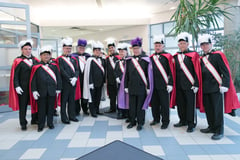The Pastoral Council’s role is to promote the Church’s mission to live and communicate the love and values of Christ in our world.
A Pastoral Council seeks to:
- enrich the quality of parish life
- provide opportunities for parishioners
- to grow in holiness
- to discover and live out their personal and community call to mission to live as Catholics who effectively transform society.
In order to fulfil its role, the Pastoral Council will:
- search out and respond to the hopes, dreams, needs and concerns of parishioners
- grow in knowledge and awareness of what is already happening in the parish
- encourage and support the good work of existing groups within the parish
- evaluate carefully information gathered in order to contribute towards the making of decisions that reflect the values of the gospel and the teachings of the Church
- set long-term and short-term pastoral goals for the parish
- provide opportunities for parishioners to grow in their relationship with God and with each other
- develop, implement and improve parish initiatives that assist parishioners in their continuing efforts to live as effective Christians in society.
The following are draft guidelines of St. Matthew’s Pastoral Council, which will be adopted upon the first council meeting.
ROLE
Our Pastoral Council’s role is to participate in God’s mission to live and communicate the love and values of Christ in the world around us.
Our Pastoral Council shares in the responsibility for the ongoing life and development of our parish community, working together with parishioners to provide support for their efforts to live as followers of Christ.
Our Parish Pastoral Council seeks to:
- Listen and respond to the hopes, ideas, needs and concerns of parishioners.
- Generate responses to these identified issues.
- Encourage and support the continuing good work of existing groups within our parish.
- Provide opportunities for parishioners
- to grow in their relationship with God and with each other
- to support and encourage them in their continuing efforts to be a Christian influence in
- the wider community.
- Set realistic and achievable short-term and long-term pastoral goals for our parish community within the framework of diocesan priorities.
- Oversee the implementation of these goals.
- Contribute towards making parish decisions that reflect the values of the Gospel and the teachings of the Church.
- Provide support for our Pastor, working collaboratively with him and with each other.
MEMBERSHIP
There will be ten members consisting of our Pastor, and nine members chosen by parishioners. In addition, ex-officio members may include the Principal of the Parish School and a member of the Finance Committee.
The Council will have as broad a membership as possible, with a diversity of age, gender and ethnic origin. Each Pastoral Councillor is a representative of the whole parish community and not a representative of a specific parish group only.
There will be a session of formation for all Council members prior to the first meeting of the newly chosen Council and after each changeover of membership.
TERM OF MEMBERSHIP
The term of membership is two years. To facilitate continuity, it is anticipated that approximately half the Pastoral Council members will choose to continue for a second term. Anyone who serves two terms consecutively will then stand down for at least one term.
NEW MEMBERS
All parishioners will be asked to recommend other parish members for possible membership of the Council. Each person recommended will be invited either to a combined Information Meeting or to an individual meeting with a Pastoral Councillor, to receive current information about Pastoral Councils. At the conclusion of this meeting, participants will be asked to indicate whether they wish to accept or decline possible membership.
If the number of acceptances of possible membership is more than required, the membership will be finalised by either negotiation or a prayerful selection process.
CASUAL VACANCIES
The Council may fill any casual vacancy by invitation. Prior to joining the Council, the proposed candidates will receive a short briefing on responsibilities and expectations as a member. After completing the remainder of the current term of membership for this casual vacancy, the new member will be eligible for recommendation for a second term.
RESPONSIBILITIES OF MEMBERS
In a spirit of prayerfulness each member of the Parish Pastoral Council will:
- Attend the regular meetings of the Parish Pastoral Council.
- Provide input to deliberations of the Council.
- Develop a spirit of enquiry and the ability to listen and understand the issues affecting the lives of parishioners.
- Provide prayerful support and encouragement for other members of the Parish Pastoral Council.
- Actively participate in the implementation of finalised plans of action.
- Embrace opportunities for personal faith development and for gaining skills to assist with effective participation in the Council’s operations.
- Represent the Parish Pastoral Council when required eg other Parish meetings, deanery or diocesan meetings.
OFFICE BEARERS
The Parish Priest plus office-bearers will form the executive of the Pastoral Council. The office-bearers, chosen by the members, will be chairperson, deputy chairperson and secretary.
The role of the executive is to:
- Reflect on the effectiveness of each previous Council meeting. What went well? What can we do better?
- Organise the agenda for each meeting, incorporating input from all pastoral councillors.
- Arrange distribution of the agenda, minutes and all relevant material one week in advance of that meeting.
- Coordinate the business of the Council between meetings.
- Arrange additional formation opportunities outside the regular meetings.
MEETINGS
There will be a minimum of ten monthly meetings of the Pastoral Council each year.
TASK GROUPS
Task groups may be set up under the auspices of the Pastoral Council for specific purposes for a definite duration and will report regularly to the Pastoral Council. These groups may include members of the Pastoral Council.
CONSENSUS
The consensus approach will be used in the process of contributing towards the making of parish decisions, with each member offering input towards the final outcome. Majority voting, lobbying, competition and domination are to be avoided.
COMMUNICATION WITH THE PARISH
The Pastoral Council will report to the parish community regularly. It will seek the input of parishioners through various means, e.g. parish consultations, focus meetings, conversations.
REVIEW OF GUIDELINES
These Pastoral Council Guidelines will be reviewed at the end of each Pastoral Council’s term, or more frequently if the need arises. Consultation with the Parish community will occur regarding any changes to these Guidelines.
Paragraph 5.1 of the Constitution for Parish Pastoral Councils (2018) outlines the parish pastoral issues for which the council is responsible. Pastoral issues, the core of the council, are those that impact on the life of parishioners in the areas of
- integration of their faith into everyday life – home, work and community
- nourishment and support of their faith as they strive to live as faithful disciples of Jesus
- outward focus for the development of a vibrant Christian community, actively engaged in Jesus’ mission of witness and service in the wider world.
If the Church is to have relevance today, ongoing efforts are essential to discovering new ways to assist parishioners in their efforts to live their faith each day. The Council’s role is to promote the Church’s mission to live and communicate the love and values of Christ in the world. It shares in the responsibility of the ongoing life and development of the faith community, working together with parishioners to provide support for their efforts to live as followers of Christ.[53] Its primary role is to encourage and support all members of the community in their efforts to respond to their baptismal call to participate in the mission of the Church.[54] Councils work together with the priest and parishioners to build up a more dynamic and vibrant Christian community which is characterised by faith, evangelisation, worship and service.[55]
The Council, in its service to the parish community, needs to reflect an understanding of the hopes and concerns of the parish. The challenge is to be attentive to the realities of life within society and continually search for ways to give meaning to people’s lives and offer a sense of empowerment and hope.[56]
- [53] – Australian Catholic Bishops Conference. 2007. Parish Pastoral Councils in Australia. Role and Function of the Parish Pastoral Council. https://www.ppc.catholic.org.au/ppc2.html [retrieved December 2017].
- [54] – Anning, C. (2007). Handbook for Parish Pastoral Councils. Third edition. Faith and Life. Archdiocese of Brisbane. Australia. (p.11).
- [55] – Ferguson, J. (2005) A Handbook for Parish Pastoral Councils. Columbia Press. Ireland. www.columbia.ie [retrieved December 2017].
- [56] – Anning, C. (2007). Handbook for Parish Pastoral Councils. Third edition. Faith and Life. Archdiocese of Brisbane. Australia. (pp.10-11).
According to paragraph 6.2 of the Constitution for the Parish Pastoral Council (2018), the Council shall comprise:
- the parish priest and his assistant priest as ex-officio members
- a representative of other pastoral workers specifically serving the parish
- between four to seven persons elected/selected in the manner provided in paragraph 7 of this Constitution, and
- such parishioners as may be co-opted by the parish priest and the council provided that the number co-opted shall not exceed the number of elected/selected members.
Membership on the Council is not a matter of appointment by the parish priest or election by the parishioners. This ministry requires particular gifts and, therefore, is best chosen by a process of discernment with the guidance of the Holy Spirit. Selecting from among parishioners who have a gift for service requires an unhurried and genuinely spiritual discernment, involving dialogue and prayer.[57]
A process of discernment (refer to section two – What is discernment?) is important as it allows the parish to explore more deeply the role of the council and offers an opportunity to watch potential members exercise their gifts. Discernment helps provide knowledge required for selecting wise Council members.[58] In determining Council membership, parishioners need to understand that the Council has a specialised role in the life of the parish and, therefore, requires people with particular faith commitment, talents and skill sets. Sharing information about the role and function of the Council lays a foundation and expresses the priest’s intention, awakens parish interest, and builds commitment to the Council.[59]
In discerning together, a parish can build up the community and inspire the confidence of everyone, including the parish priest. The discernment and, ultimately, transition of new members to the Council can be an opportunity for renewal and growth in all members of the Council.[60]
- [57] – The Archdiocese of Los Angeles. 2010. Implementation Guide for Parish Pastoral Councils. http://handbook.la-archdiocese.org/Handbook%20Resources/implem_guide_for_parish_pastoral_councils.pdf [Retrieved January 2018]
- [58] – Fischer, Mark, F. (2008) Introduction to Parish Pastoral Councils. Discerning Councillors. http://www.mfischer.stjohnsem.edu/Chapter%20PDFs/16 .DiscernmentofMembers.pdf
- [59] – Fischer, Mark, F. (2008) Introduction to Parish Pastoral Councils. Discerning Councillors. http://www.mfischer.stjohnsem.edu/Chapter%20PDFs/16 .DiscernmentofMembers.pdf
- [60] – Diocese of Pittsburgh. (2010). One Body. One mission. The Parish Pastoral Council Guidelines of the Diocese of Pittsburgh. [Retrieved December 2017]. (p.64)
All parishioners are potential members and membership should be open to all, respecting the reality that each person is unique with potential to make a specific contribution. For the Council to be representative of the parish, its membership is made up of those with a diversity of gifts and skills.
The process used for identifying new members will, but should include some opportunity for all parishioners to participate. Special attention is given to diversity in the community, age, social conditions, professions of parishioners and the role they hold in the parish. The priest and parish members need to decide upon a method of discerning prayerfully the selection of members that fit the particular needs of the parish.
To determine the number of vacancies which will occur on the Council, before election of members to the Council, current members need to make known their intention. Paragraph 7.2 of the Constitution for the Parish Pastoral Council(2018) states:
Where an election is to be held at a meeting, at least fourteen (14) days prior to the meeting the Council shall:
(a) publicise the criteria for membership, as stated in Section 6.1
(b) prepare a complete list of the names of current members of the Council to give to the meeting
(b) indicate which, if any, members are eligible for re-election
(c) determine the number of elected members to be included on the Council
(d) determine the method of nomination for election to the Council.



